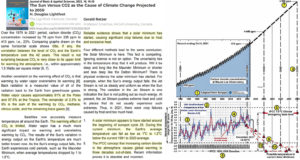by P. Gosselin, Mar 19, 2023, in NoTricksZone
Feel helpless when trying to assess the veracity of “climate doom is looming” claims? Don’t give up trying to understand the relevant basics because you don’t need to be a scientist to do so.
There is a rather simple way to get an idea about what this is all about. Even without a scientific background, most people have at least a good common sense. And that’s all it takes to get a grasp of how energy flows back and forth between earth’s surface and the skies.
Today in Part 5, we look at the linkage between the allegedly CO2-driven rise of air and sea surface temperatures on the one side and the disconnect between these increases and their strangely weak to insignificant impact on rainfall and hurricane intensity”.
Preceding chapters see Part 1 1), Part 2 2), Part 3 3), Part 4 4).
Variability of cloud effects vs “greenhouse gas” effects
In the last chapter, we have seen that there are some discrepancies between the global warming trend as claimed by the official climate science and the local evolution of rainfall, which should be a direct consequence of higher temperatures since this causes more evaporation. This seems not to be the case e.g. for Germany, see Fig. 1:
…

 This second business-as-usual prediction was that there would be 1.8 C° warming from preindustrial times to 2030. Deducting the 0.45 C° warming up to 1990, the prediction amounted to 1.35 C° or about 0.34 C°/decade. Thus, IPCC predicted 0.3-0.34 C°/decade medium-term warming. However, only 0.14 C°/decade has occurred since 1990
This second business-as-usual prediction was that there would be 1.8 C° warming from preindustrial times to 2030. Deducting the 0.45 C° warming up to 1990, the prediction amounted to 1.35 C° or about 0.34 C°/decade. Thus, IPCC predicted 0.3-0.34 C°/decade medium-term warming. However, only 0.14 C°/decade has occurred since 1990
